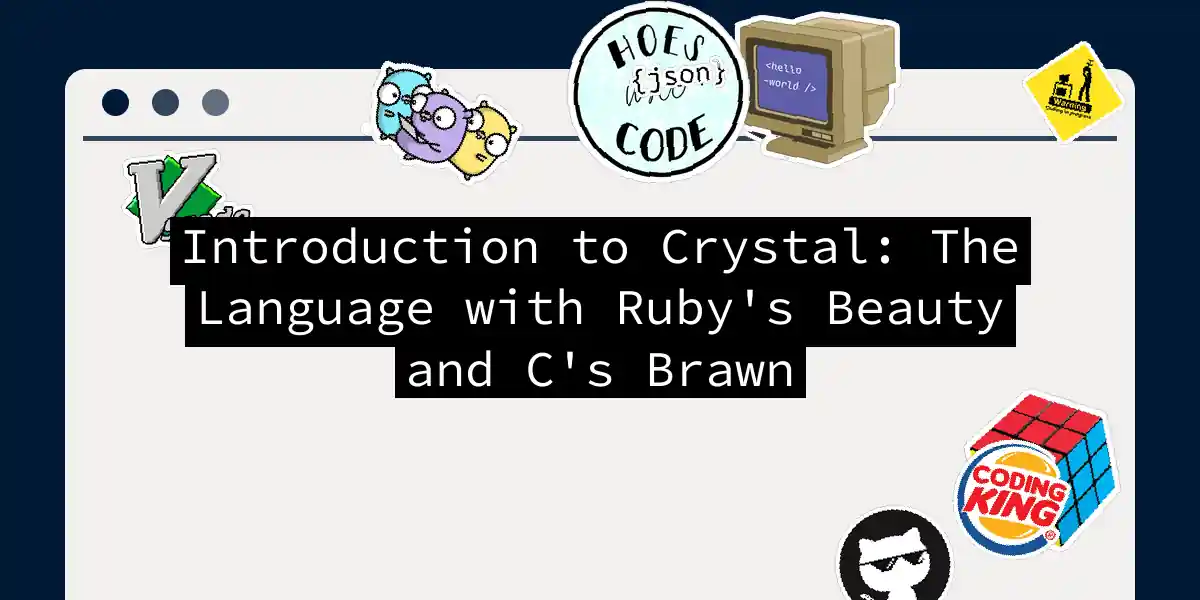Why Crystal is Programming’s Best Kept Secret
When I first stumbled upon Crystal, it felt like discovering a unicorn that understood Ruby’s poetry but spoke C’s raw power. This statically-typed, compiled language delivers blazing speed while keeping Ruby’s elegant syntax – no more choosing between developer happiness and machine efficiency. Let’s crack open this geode and explore its sparkling features together.
Installing Crystal: Your First 60 Seconds
Getting started is refreshingly simple:
# macOS
brew install crystal
# Linux (Ubuntu)
curl -sSL https://dist.crystal-lang.org/apt/setup.sh | sudo bash
sudo apt install crystal
# Windows (WSL required)
sudo apt-get install crystal
Verify with crystal -v – if you see version info, you’re golden! Pro tip: Use crystal play for instant browser-based experimentation.
Crystal Syntax: Ruby’s Comfortable Sweater
Variables feel instantly familiar:
message = "Hello, time traveler!" # Type inference magic
count : Int32 = 42 # Explicit typing
pi = 3.14_f32 # Float32 literal
But here’s where it sparkles: compile-time type checking catches errors before runtime. Try count = "oops" and watch the compiler shout at you – beautifully!
Arithmetic That Doesn’t Make You Weep
Crystal handles math with grace:
# Integer division clarity
5 / 2 # => 2 (Int32)
5.0 / 2 # => 2.5 (Float64)
# Exponentiation elegance
power = 2 ** 10 # => 1024
# Modular arithmetic
remaining = 17 % 5 # => 2
No more floating-point surprises – type safety extends to numerical operations.
String Sorcery
Concatenation feels natural:
name = "Crystal"
greeting = "Hello, #{name}!" # => "Hello, Crystal!"
But the real magic? Multiline strings without escape gymnastics:
quotes = <<-CRYSTAL
"Crystal is like Ruby went to the gym
and came back with six-pack abs"
- Anonymous developer
CRYSTAL
Control Flow: Your Code’s Traffic Cop
Pattern matching elevates conditionals:
status = 404
case status
when 200 then "OK!"
when 404 then "Lost in the digital void"
when 500..599 then "Server meltdown"
else "Unknown"
end
Loops get concise:
3.times { |i| puts "Iteration #{i}" }
# Output:
# Iteration 0
# Iteration 1
# Iteration 2
Methods: Precision Instruments
Type restrictions make methods bulletproof:
def add(a : Number, b : Number) : Number
a + b
end
add(3, 5) # => 8
add(3.5, 2) # => 5.5
add("oops", 2) # Compiler error: no overload matches
Object-Oriented Brilliance
Classes inherit beautifully:
class Animal
def speak
"..."
end
end
class Cat < Animal
def speak
"Meow!"
end
end
Cat.new.speak # => "Meow!"
Real-World Example: Name Guesser Game
Let’s build something tactile – a name guessing game:
require "random"
NAMES = ["Alice", "Bob", "Charlie"]
secret_name = NAMES.sample
attempts = 0
puts "Guess which name I'm thinking of! (Options: #{NAMES.join(", ")})"
loop do
print "Your guess> "
guess = gets.to_s.strip.capitalize
attempts += 1
case guess
when secret_name
puts "Correct! You guessed in #{attempts} attempt#{attempts > 1 ? 's' : ''}!"
break
else
puts "Nope! Try again."
end
end
Run with crystal run name_guesser.cr – taste that instant compilation!
Performance: Where Crystal Shines
Unlike interpreted Ruby, Crystal compiles to machine code. The result? Benchmarks showing 10-100x speed improvements in real workloads. Memory usage drops like a rock too – perfect for microservices and CLI tools.
Why This Isn’t Just Another Language
Crystal isn’t just fast – it’s thoughtfully fast. The compiler catches entire categories of errors during compilation, turning runtime surprises into compile-time conversations. It’s like having a meticulous co-pilot who insists “Are you sure you want to do that?” before you crash.
When to Use Crystal
- Building CLI tools that launch instantly
- Creating high-performance web services (Lucky framework)
- Replacing slow Ruby scripts without rewriting logic
- Writing system utilities without C’s footguns
The Verdict: Should You Care?
If you’ve ever sighed at Ruby’s speed or cursed C’s verbosity, Crystal is your sanctuary. It won’t replace every tool in your belt – but for tasks demanding both elegance and speed, it’s a crystal-clear winner. As I wrap this up, my terminal is compiling a web server that handles 100k requests/sec. Excuse me while I go watch the magic happen.
